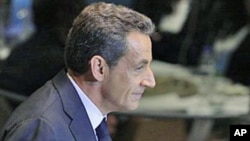Senior Palestinian officials say they will not back away from plans to apply for full statehood in the U.N. Security Council on Friday despite pressure from the United States and Europe. French President Nicolas Sarkozy said Wednesday Palestinians should, for the time being, accept upgraded U.N. observer status and return to direct peace talks with Israel.
The Palestinians are facing heavy pressure to shelve their U.N. membership bid, including an admonition from U.S. President Barack Obama Wednesday that the “short cut” of U.N. action will bring neither statehood nor self-determination.
But top Palestinian officials insist that full U.N. member status would strengthen their hand in eventual negotiations with Israel to end its West Bank “occupation,” and that Palestinian authority needs action to preserve its political credibility.
Speaking after Mr. Obama’s U.N. General Assembly speech, veteran Palestinian official Nabil Sha’ath said Palestinian President Mahmoud Abbas will ask U.N. Secretary General Ban Ki-Moon Friday for a statehood vote in the U.N. Security Council.
He said a parallel request for elevated observer status in the U.N. General Assembly would suggest the Palestinians aren’t really serious about their statehood aspirations.
“We will give it real try," said Sha’ath. "We’re not bluffing. We’ll really give it a real try. And if we fail, we will keep knocking at the door of the Security Council later. But when do we go to the General Assembly? It is a decision that has not been made yet. Most likely we will, but when is a decision has not been made yet.”
|
Listen to US President Barack Obama's remarks on Israel-Palestinians:
|
IThe United States and European allies fear that a statehood bid in the Security Council, that would face a certain U.S. veto, would inflame Middle East tensions and set back peace hopes.
Members of the U.S. Congress have threatened to cut funding to the Palestinians, and even the United Nations itself, if statehood advances in the Security Council.
In a General Assembly speech widely seen as a compromise effort, French President Nicolas Sarkozy proposed that Palestinians be given upgraded observer status while setting out a roadmap for direct talks with Israel to be concluded within a year.
“Let us begin negotiations and adopt a precise and ambitious timetable," said President Sarkozy. "Sixty years without moving one centimeter forward. Doesn’t that suggest we should change the method and scheduling here? Let’s have one month to resume discussions. Six months to find an agreement on borders and security. One year to reach a definitive agreement.”
President Obama told the assembly “there is no shortcut” to ending the Israeli-Palestinian conflict, and that peace will not come through U.N. statements or resolutions.
Later in bilateral meeting with Mr. Obama, Israeli Prime Minister Benjamin Netanyahu said standing with Israel and supporting direct talks is a badge of honor for the United States.
“I think the Palestinians want to achieve a state through the international community, but they’re not prepared yet to give peace to Israel in return," said Prime Minister Netanyahu. "And my hope is that there will be other leaders in the world, responsible leaders, who will heed your call, Mr. President, and oppose this effort to shortcut peace negotiations - in fact, to avoid them. Because I think that avoiding these negotiations is bad for Israel, bad for the Palestinians, and bad for peace.”
The Israeli prime minister has said he is ready to meet Mr. Abbas this week in New York to resume direct peace talks without preconditions.
Palestinian spokesman Sha’ath, however dismissed the Netanyahu offer as theatrics. He said the Palestinians would resume the stalled talks tomorrow, if Israel would show good faith by freezing settlement activity and ending the siege of Gaza.




